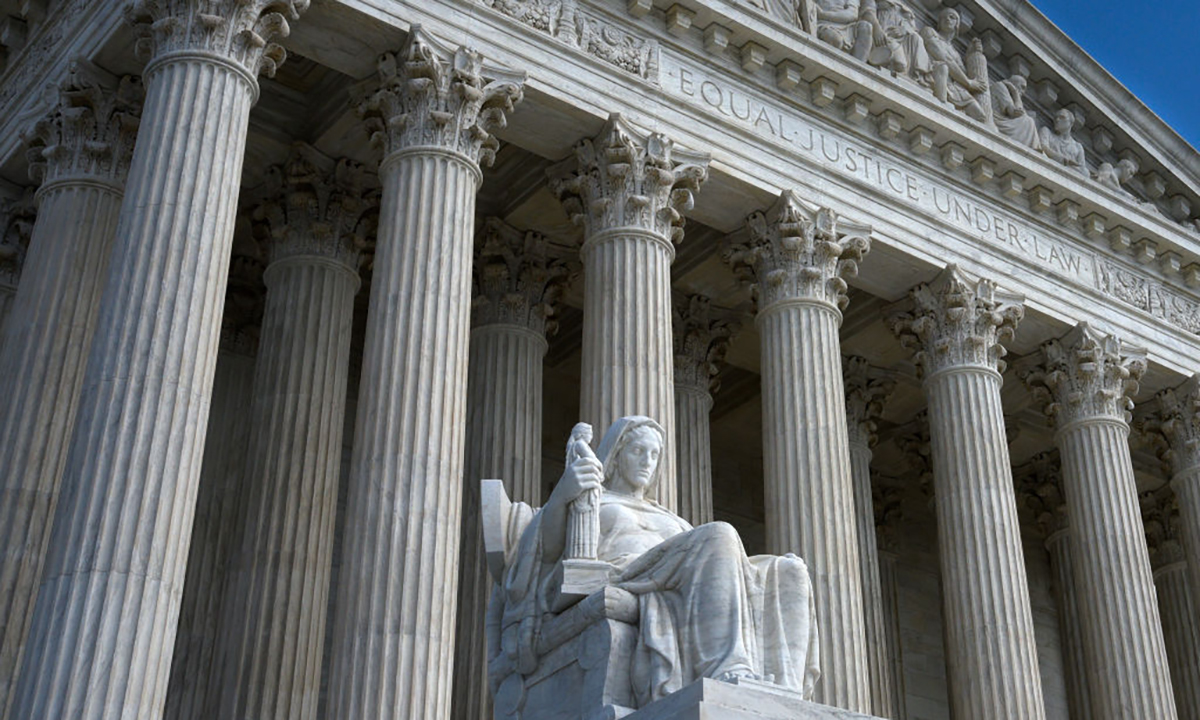Supreme Court Skirts Question of Whether Charter Schools are Public
Several charter advocates breathed a sigh of relief, but future cases on public financing of religious schools loom on the horizon.

Get stories like this delivered straight to your inbox. Sign up for The 74 Newsletter
The U.S. Supreme Court on Monday declined to take up a case that could have upended the long-held view that charter schools are public, throwing into doubt — for now — a controversial effort to publicly finance religious schools.
The court decided not to hear a North Carolina case involving a public charter school’s dress code. While the case involved a requirement that girls wear skirts, its implications soon expanded after its founder said the school essentially operates as a private institution with public funding.
The case dates back to 2016, when three families sued Charter Day School, a classical charter school, on behalf of their daughters. At the school, which opened in 1999, students must address adults as “sir” or “ma’am” and can’t have “radical” hairstyles. It requires girls, whom it refers to as “fragile vessels,” to wear jumpers, skirts or skorts — skirts with shorts attached underneath.
Though the requirements were meant to promote respect and “chivalry,” the families argued that it violated the girls’ constitutional rights.
The school’s founders countered that it should be free to enforce rules in line with its mission to provide an education focused on traditional virtues. As a nonprofit, they argued, the school is not a “state actor” like a traditional public school.
Charter Day School lost that argument before the 4th Circuit Court of Appeals last year. Judge Barbara Keenan wrote that its nonprofit status didn’t give it the freedom to enforce a dress code that discriminated against girls.
The school, she wrote, is furthering the “state’s constitutional obligation to provide ‘free, universal’ elementary and secondary education to its residents” and contrary to being private, it “performs a function traditionally and exclusively reserved to the state.”
It was the first time an appellate court had considered whether a student could sue a charter school under the federal equal protection clause. Past cases that hinge on the state actor issue have focused on employee-related disputes.
Attorneys general in 10 GOP-controlled states had urged the high court to consider the case. The Biden administration, in filings, urged the justices to pass on the case.
Since Minnesota passed the first charter school law in 1991, lower courts have widely held that charters are public schools and that its students enjoy the same civil rights protections as their peers in traditional schools.
But the case took on far greater meaning given the Supreme Court’s drift in favor of allowing public funds to flow to private schools. That alarmed charter groups, which worried a high court embrace of the private status of charter schools could wreak havoc on the sector.
They welcomed Monday’s decision.
“Charter schools are public schools and are, in fact, state actors for the purposes of protecting students’ federal constitutional rights,” said Nina Rees, president and CEO of the National Alliance of Public Charter Schools.
“The actions of the high court affirm that as public school students, charter school students are entitled to the same federal protections as their counterparts who attend district schools,” Rees said in a statement.
Some legal scholars make the case that Supreme Court rulings in two school choice cases — Espinoza v. Montana Department of Revenue and Carson v. Makin — paved the way for allowing religious organizations to run charter schools.
Nicole Garnett, a Notre Dame University law professor and senior fellow at the conservative Manhattan Institute, on Monday said the high court “will [and should] address” the issue of public v. private actors in a future case — she noted that the North Carolina case was arguably “a bad vehicle for resolving the question.”
One challenge the court might face, though, is that individual state charter laws “vary significantly.” That makes it hard, if not impossible, to answer the question at a national level. “That said, my view is that, in most if not all states, charter schools are private, not government, actors.”
In a statement, Charter Day School founder Baker A. Mitchell said the 4th Circuit Court’s opinion designating Charter Day School a “state actor” will be applied to charter schools everywhere, “threatening their autonomy, subjecting them to the same rules, regulations, and political machinations that have crippled government-run school systems, and worst of all, leaving many low-income parents and students with no option other than poorly performing district schools.”
Oklahoma became the first state to approve an application for a Catholic charter school — St. Isidore of Seville Virtual Catholic Charter School — earlier this month. Lawsuits are expected in that case and could reach the Supreme Court in coming years.
Derek Black, a professor at the University of South Carolina School of Law, said it’s difficult to read too much into the court’s simple decision not to hear a case, “but I read this as a strong validation of the general rule that charters are state actors that are subject to the Constitution.”
He called Monday’s decision “devastating news for those in Oklahoma who think the state can authorize religious charter schools.”
The justices discussed the North Carolina case, Charter Day School Inc. v. Peltier, in conference last Thursday.
Those who wanted the court to hear the case, such as the Great Hearts Academies network of classical charter schools, have said the 4th Circuit decision conflicts with how three other federal circuit courts have ruled. Those lower courts have relied on the precedent in Rendell-Baker v. Kohn, in which the Supreme Court said a private school receiving state funds for educating “maladjusted” high school students was not acting under the “color of state law” when it fired a counselor and five teachers.
Greg Richmond, superintendent of the Archdiocese of Chicago Catholic Schools, said the justices’ refusal to hear the case leaves the sector with some uncertainty. “Which is it going to be? Are they going to be schools that can be religious and set their own rules? Or are they going to be schools where the public sets the rules? In Oklahoma, you have one decision. And now in North Carolina, you have the opposite decision.”
Richmond, who formerly led the charter authorizer’s association, also said he hopes the high court’s decision isn’t interpreted expansively as prohibiting charter schools from having dress codes.
“That would be really a tragedy if it did land that way,” he said. “… I think a lot of parents want to have a school that has a dress code and would hate to lose that because of this case.”
More broadly, he worried that by bringing the dress code case in the first place, the families in North Carolina have worn away some of charters’ autonomy. “Here’s a school that wanted to do something,” he said. “The government took away his ability to do it. It’ll be viewed through this frame … that charter schools are slowly losing their autonomy to be different.”
Get stories like these delivered straight to your inbox. Sign up for The 74 Newsletter

;)

